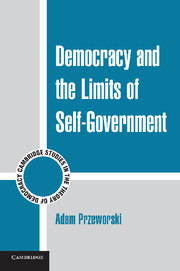Book contents
2 - Self-Government of the People
Published online by Cambridge University Press: 05 June 2012
Summary
THE IDEAL OF SELF-GOVERNMENT
The ideal that justified the founding of modern representative institutions was “self-government of the people.” The problem to be solved, as posed by Rousseau (1964 [1762]: 182), was to “find a form of association which defends and protects with all the shared force the person and the goods of each associate, and through which each, uniting with all, still obeys but himself, remaining as free as before.” Self-government of the people was the solution to this problem. Self-government, in turn, was desirable because it was the best system to advance liberty, understood in a particular way as ‘autonomy’: We are free when we are bound only by laws we choose. As Dunn (1993: vi) observes, the idea of autonomy is the source of “the power and appeal of democracy.” “In sharp contrast to the autocratic alternative,” writes another contemporary theorist, “democracy aims to empower all citizens in equal measure. However short of this claim democracies may fall, it is this goal – the goal of autonomy – that characterizes them most centrally in normative and empirical terms” (Lakoff 1996: 155).
As formulated originally, this ideal is neither coherent logically nor feasible practically. When we are governed collectively, each of us cannot obey but oneself. Choosing freely for oneself is not a reasonable criterion for evaluating real democracies. But if the original ideal of self-government cannot be realized, what is the best possible?
- Type
- Chapter
- Information
- Democracy and the Limits of Self-Government , pp. 17 - 43Publisher: Cambridge University PressPrint publication year: 2010

